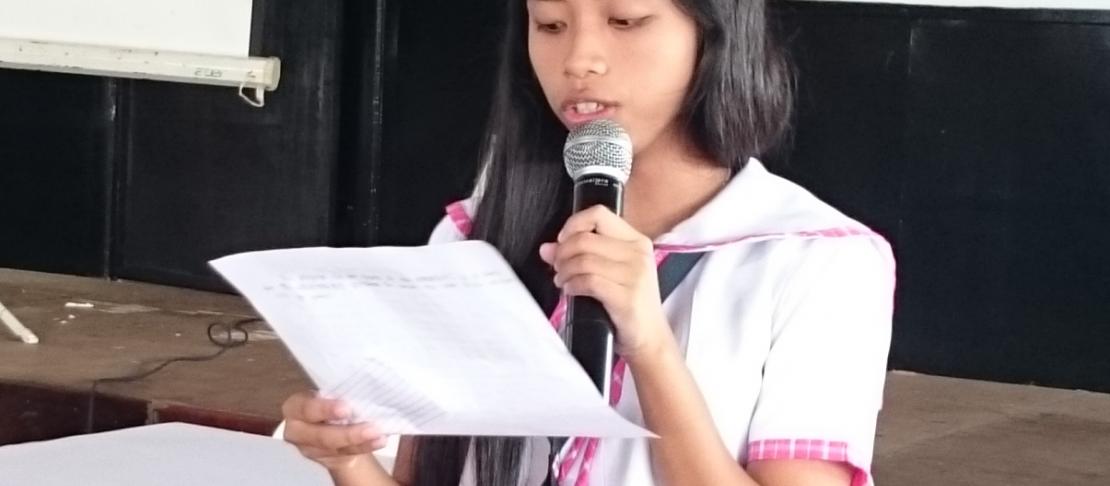Philippine student journalists primed for climate change reporting

Training young people on climate change reporting instills awareness and consciousness to take part in gainful initiatives that could help curb climate change impacts.
Climate change is affecting a major portion of the global population regardless of class, race, age or gender. Thus, everyone, especially the youth, should join in addressing challenges and issues that climate change brings forth. Fact remains that whether they like it or not, they will bear the burden not only of the present time but also the future effects of climate change.
Seventy-six student journalists from 27 schools in the southern Philippines learned about climate change-related news reporting during a media workshop series in the Philippines. The third part of the series was held on 17-19 September 2015 in the municipality of Del Carmen, Siargao Island, southern Philippines.
The media workshop series is titled, “Climate Change: Gets Mo Na Ba?” (“Climate Change: Do You Get It?”). It aims to engage the Philippine regional media in improving coverage of climate change, agriculture, and food security-related issues. The first two days of the media workshop featured presentations, field trip, and story ideas group discussion.
It was attended by 40 journalists from print, broadcast (radio and television) and other government offices and organizations in Mindanao, southern Philippines. The workshop for student journalists was held on the third day of the media workshop seminar.
Collaboration between public and private organizations made the workshops possible. The workshop series is sponsored by the Philippine Agricultural Journalists (PAJ), Metro Pacific Investments Corporation (MPIC), Smart Communications, Philex Mining Corporation and the Philippine Department of Agriculture (DA).
Also supporting the series are the local government of Del Carmen, the CGIAR Research Program on Climate Change, Agriculture and Food Security in Southeast Asia (CCAFS SEA), the International Rice Research Institute (IRRI), the World Agroforestry Centre (ICRAF), Philippine Federation of Rural Broadcasters (PFRB), Philippine Science Journalists (PsiJourn) and the Philippine Network of Environmental Journalists, Inc. (PNEJ).
Environmental journalists of the future
The highlight of the event, however, was the actual writing workshop, an activity unique to this part of the workshop series. It was specifically requested by Del Carmen mayor Alfredo Matugas Coro II. This activity also aimed to increase the understanding of student journalists on issues around climate change.
In his opening remarks, PAJ Vice-President Noel Reyes said: “Among the student participants are future journalists who can help avoid confusion and give correct information to the public about climate change.”
The workshop was led by Imelda Abaño, president of the Philippine Network of Environmental Journalists (PNEJ). She commented that environmental news, especially climate change, remain underreported by the mainstream media partly because it is a new concept that the reporters themselves do not fully understand.
She gave tips on how to write more interesting climate stories by looking for human dimensions in environmental issues. She also highlighted the importance of understanding the science behind climate change and using correct terminologies.
The students and their mentors also participated in a story ideas workshop where they came up with three climate change or environment-related story ideas that can be developed into a full story for their respective school papers. Then, they presented story ideas to the whole group and awards were given to the top stories.
Next steps: engaging the local media
The first part of the workshop series was held in Legazpi City, Albay province, an area prone to typhoons and natural disasters, as it is home to the Mayon Volcano, which is part of the Pacific Ring of Fire. The second workshop was conducted in Tacloban City, Leyte province, where Super Typhoon Haiyan first made landfall in November 2013.
In the pipeline are the last part of the seminar workshop scheduled for Tugegarao, Cagayan province and the guidebook on climate change reporting being developed by PAJ and PNEJ, and which will be published through CCAFS SEA.
There are also plans to set up a virtual platform for communication among journalists, CGIAR scientists and other climate change experts to discuss important issues and potential stories. It will also serve as a repository of information and media resources such as photos and videos that the media can browse through and use for their stories.
Related to this, CCAFS SEA in partnership with PFRB also piloted a rural radio campaign promoting climate-smart agriculture in the Philippines. This campaign is expected to reach out to farming communities through the services and programs of 150 rural broadcasters all over the country.
Read more:
- Sharing climate change science with Philippine provincial media
- CCAFS-SEA kicks off first media workshop on how to report about climate change with impact
- Tune in: Philippine rural broadcasters to promote climate-smart agriculture
Amy Cruz is the junior communications specialist for the World Agroforestry Centre Philippines. She is also a communication consultant with the CCAFS SEA program. Regine Evangelista is a researcher with the World Agroforestry Centre Philippines.



